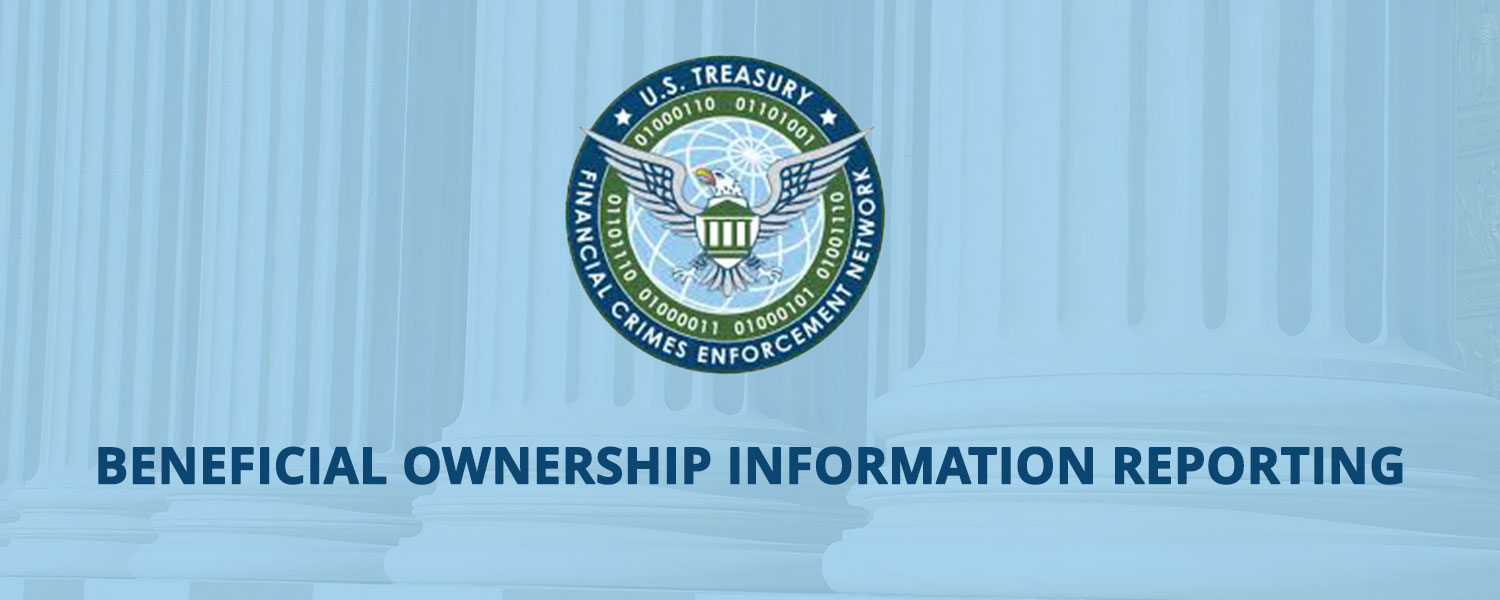FinCEN Issues Final Rule Limiting Reporting Requirements in Connection with Beneficial Ownership Information Reporting Deadlines under the Corporate Transparency Act
“This is a victory for common sense,” said U.S. Secretary of the Treasury Scott Bessent. “[This] action is part of President Trump’s bold agenda to unleash American prosperity by reining in burdensome regulations, in particular for small businesses that are the backbone of the American economy.”
The Federal government in its efforts to crack down on illicit finance and enhance transparency on September 29, 2022 issued a ruling establishing a beneficial ownership information reporting requirement, pursuant to the Corporate Transparency Act (CTA). This rule will require most corporations, limited liability companies, and other entities created in or registered to do business in the United States to report information about their beneficial owners – the persons who ultimately own or control the company – to the United States Treasury Department’s Financial Crimes Enforcement Network (FinCEN). These filings are commonly referred as “BOI reports”.
Purpose Of Reporting
Designed to protect U.S. national security and strengthen the integrity and transparency of the U.S. financial system, FINCEN stated that this ruling will help to stop criminal actors, including oligarchs, kleptocrats, drug traffickers, human traffickers, and those who would use anonymous shell companies to hide their illicit proceeds.
“For too long, it has been far too easy for criminals, Russian oligarchs, and other bad actors to fund their illicit activity by hiding and moving money through anonymous shell companies and other corporate structures right here in the United States,” said Acting FinCEN Director Himamauli Das. “This final rule is a significant step forward in our efforts to support national security, intelligence, and law enforcement agencies in their work to curb illicit activities. The final rule will also play an important role in protecting American taxpayers and businesses who play by the rules, but are repeatedly hurt by criminals that use companies for illegal reasons.”
Adversity To The CTA Heats Ups Towards The End Of 2024
But with the December 31, 2024 deadline approaching, we saw a lot of judicial action towards the end of 2024 and into the beginning of 2025 challenging this law.
Here is the sequence/timeline and status:
- District Court holds CTA is unconstitutional and issues preliminary injunction preventing enforcement of the CTA.
- Government immediately files motion to stay the preliminary injunction pending appeal (i.e. enforcement for the CTA continues).
- On 12/17/2024, District Court denies Government’s motion to stay the preliminary injunction pending appeal (i.e. no enforcement of the CTA allowed)
- On 12/23/2024, 5th Circuit Court of Appeals grants the Government’s motion to stay the preliminary injunction (i.e. enforcement of the CTA continues).
- On 12/26/2024, 5th Circuit Court of Appeals vacates the portion of the Order that allowed the Government to enforce the CTA.
- On 01/23/2025, the U.S. Supreme Court grant’s Government’s motion to stay the preliminary injunction pending appeal (i.e. enforcement of the CTA allowed)
- On 02/17/2025, the District Court for the Eastern District Of Texas grants Government’s motion to stay the preliminary injunction pending appeal (i.e. enforcement of the CTA allowed).
FinCEN Issues The “Final” Interim Rule.
On March 21, 2025 FinCEN issued a BOI interim final rule that is consistent with the Treasury Department’s March 2, 2025 press release whereby the reporting requirements now apply only to foreign reporting companies, and only foreign beneficial owners of those foreign reporting companies must be reported.
The impact of this final interim rule is what initially required 32 million+ entities to report now requires roughly 12,000.
FinCEN adopted this interim final rule to narrow the existing beneficial ownership information (BOI) reporting requirements under the Corporate Transparency Act (CTA) to require only entities previously defined as “foreign reporting companies” to report BOI. Under this interim final rule, entities previously defined as “domestic reporting companies” are exempted from the reporting requirements and do not have to report BOI to FinCEN, or update or correct BOI previously reported to FinCEN. With limited exceptions, the interim final rule does not change the existing requirement for foreign reporting companies to file BOI reports, but it extends the deadline to file initial BOI reports, and to update or correct previously filed BOI reports, to 30 days from the date of this publication to give foreign reporting companies additional time to comply. However, the interim final rule exempts foreign reporting companies from having to report the BOI of any U.S. persons who are beneficial owners of the foreign reporting company and exempts U.S. persons from having to provide such information to any foreign reporting company for which they are a beneficial owner.
What Information Gets Reported
In each report to FinCEN, a reporting company must provide each beneficial owner’s name, date of birth, residential or business address, and a unique identifying number from an acceptable identification document (such as a state driver’s license or passport).
Penalties for Violating CTA
The willful failure to report complete or updated beneficial ownership information to FinCEN, or the willful provision of or attempt to provide false or fraudulent beneficial ownership information may result in a civil or criminal penalties, including civil penalties of up to $500 for each day that the violation continues, or criminal penalties including imprisonment for up to two years and/or a fine BOI Ownership Information report may be held accountable for that failure. However, the CTA contains a safe harbor from such civil and criminal liability for the submission of inaccurate information if the person who submitted the report voluntarily and promptly corrects the report within 90 days.
Don’t Take The Chance And Lose Everything You Have Worked For.
Protect yourself. You can expect the laws regarding customer due diligence requirements for financial institutions will also be updated to conform to the CTA as the CTA will be providing a new means for a financial institution to verify a customer’s “Know Your Customer” information. If you are selected for an audit, stand up to the IRS by getting representation. Tax problems are usually a serious matter and must be handled appropriately so it’s important to that you’ve hired the best lawyer for your particular situation. The tax attorneys at the Law Offices Of Jeffrey B. Kahn, P.C. located in Orange County (Irvine), Los Angeles and elsewhere in California are highly skilled in handling tax matters and can effectively represent at all levels with the IRS and State Tax Agencies including criminal tax investigations and attempted prosecutions, undisclosed foreign bank accounts and other foreign assets, and unreported foreign income. In addition, tax attorneys at the Law Offices Of Jeffrey B. Kahn, P.C. can complete or update BOI reporting for your business. Additionally, if you are involved in cannabis, check out what a cannabis tax attorney can do for you. And if you are involved in crypto currency, check out what a bitcoin tax attorney can do for you.










